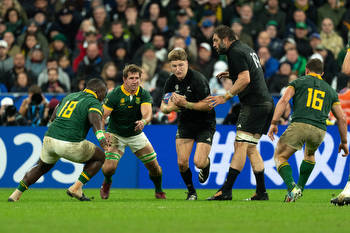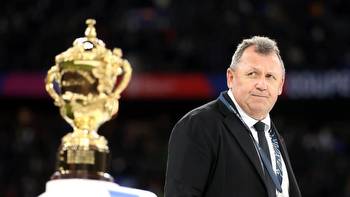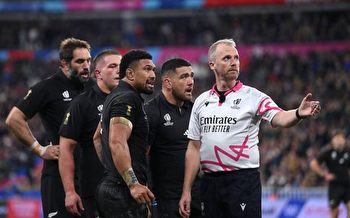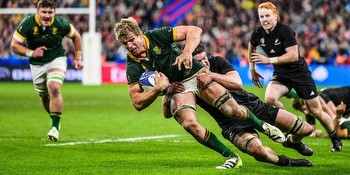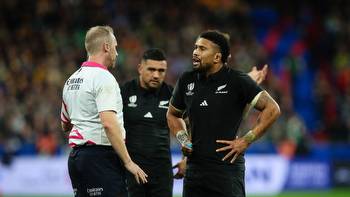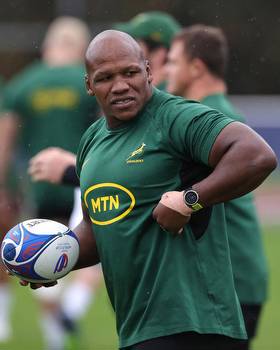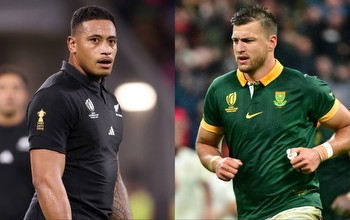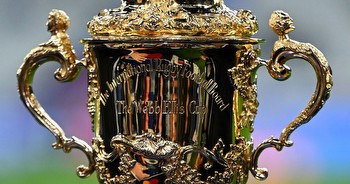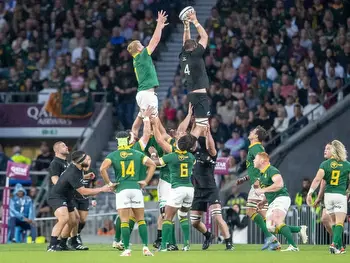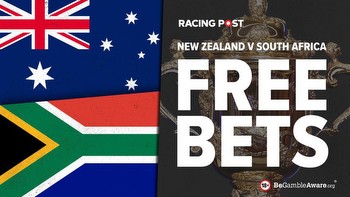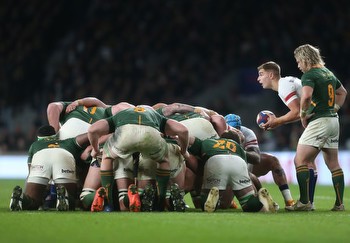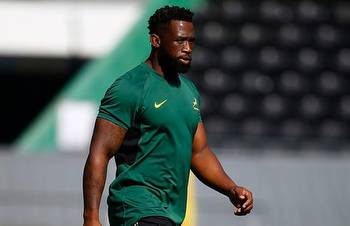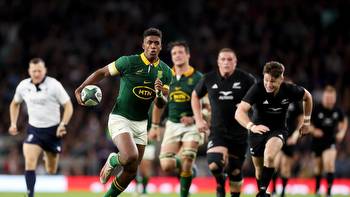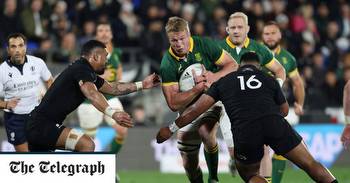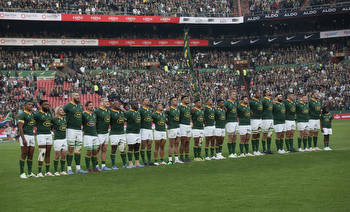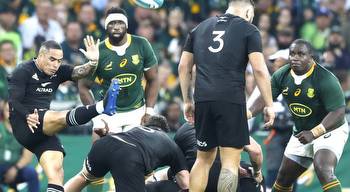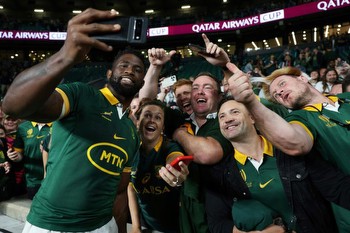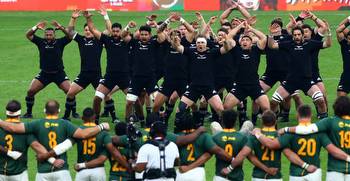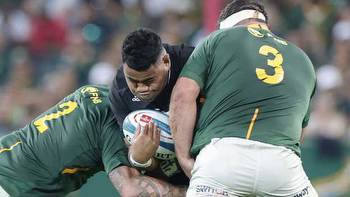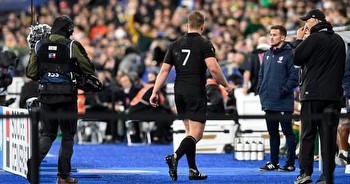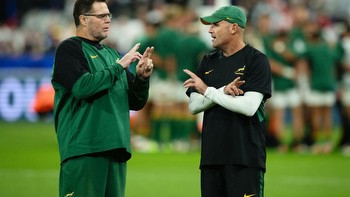All Blacks v Springboks: Five takeaways from the Rugby World Cup Final
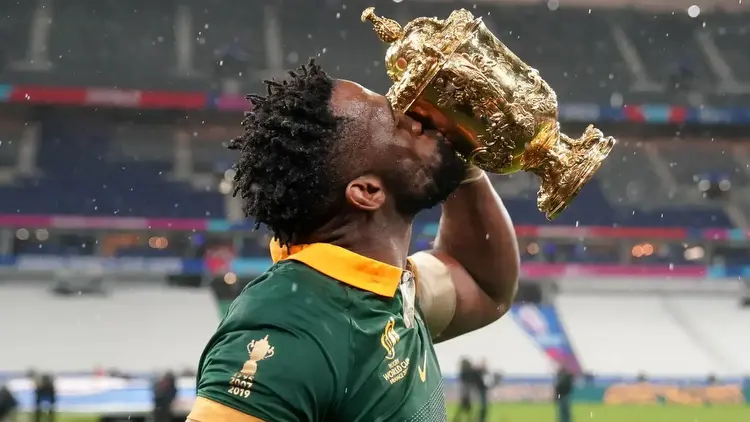
Following a 12-11 victory for the Springboks over the All Blacks in the Rugby World Cup Final, here’s our five takeaways from the game at the Stade de France.
The top line
South Africa became the second team in history to win back-to-back World Cups as the two best sides in the world treated 80,075 spectators to an absolutely magnificent spectacle in the rain of Paris.
The scoreline – 12-11 – made it the third consecutive match in which the try-less Springboks have got over the line by a single point, emphasising how their attention to detail in winning marginal moments characterises their rugby existence.
12 points from the boot of Handre Pollard was enough to see the Boks home in a match packed with incident – from cards to disallowed tries – it had it all. But at the centre of the win by South Africa, one based on defence, was one of the greatest performances seen in a Rugby World Cup Final as Pieter-Steph du Toit hammered 28 magnificent tackles, a turnover and ran 27 metres with two offloads.
The All Blacks were magnificent; playing with 14 men for much of the game, most of the ambition came from their brilliant backs, but against a defence that racked up a total of 209 tackles and missed only 12% of them. Territory was their enemy, forced to play from deep positions for much of the match as the Bok line speed held them back in their own half. Perhaps with that extra man things may have been different, but South Africa have made a habit of winning the tight margins and in Paris on Saturday they won the biggest one of all – the Rugby World Cup.
Bok back-row
At the heart of this win was two world class flanks in Siya Kolisi and Du Toit who delivered a performance in defence that looked as if New Zealand’s flames had been extinguished with a fire blanket. It was suffocating, breathless and all enveloping, with blistering line speed, perfect focus and quite astounding precision.
And it wasn’t as if New Zealand’s back-row, Cane’s red notwithstanding, were poor, as Ardie Savea and Shannon Frizell were simply everywhere both sides of the ball for much of the game.
Kolisi’s and Du Toit’s work wasn’t only in defence; the second half saw both magnificent flanks go as close as you’d like with ball in hand and it was only brilliant defence in either corner of the pitch that kept the barrelling Boks at bay. But in the 45th minute, Kolisi’s enthusiasm got the better of him as a stray shoulder to the head of Savea forced Wayne Barnes to wave another yellow card in the direction of the skipper.
But that man Du Toit kept on hitting – time and time again he cropped up for the perfect moment with his tackle on Jordie Barrett in the dying moments as the All Blacks tried to run out of their 22 almost demolishing the Stade de France itself.
It wasn’t only the starters – Kwagga Smith’s rip off Will Jordan emphasised the tiny flank’s incredible precision and intellect and with Deon Fourie, his poor lineout throwing apart, running around the pitch more like a 16-year-old than a man of 37, it was a masterclass from the Bok loosies that saw them home.
Discipline
This was always going to be a thriller and from the very first moment of the immaculate Wayne Barnes whistle, 80,000 were treated to opening salvos of passion, power and precision.
The common wisdom in the press box before kick-off was that these two sides couldn’t be separated in terms of prediction, but with weather conditions and crowd support definitely favouring the South Africans, Frizell pushed the scales further in the Boks’ favour as his ruck clearance resulted in a leg roll clear-out on Bongi Mbonambi to receive a yellow after two minutes, to see Fourie enter the fray in place of the limping hooker.
South Africa managed six points during the yellow card period, but when Frizell returned, he came back like a man possessed – causing the Boks a lot of issues with direct running in the wide channels as a second receiver.
But not content with one card, skipper Cane, having an absolutely storming match on the gainline, caught Jesse Kriel hard and high with a swinging arm after 28 minutes, and to collect the rather unfortunate accolade of becoming the first player ever to be sent off in a Rugby World Cup final.
There may not have been much to choose between the sides in terms of rugby ability but there’s no doubt that the discipline of the Springboks was the difference between these two great teams, but many wearing black in the ground might just have wondered how Eben Etzebeth didn’t spend 10 minutes off with one of he most obvious pieces of lazy running you’ll ever see whilst New Zealand were in full attacking flow.
However, whilst the All Blacks played 70 minutes with 14 players, it must also be noted the Boks had two yellow cards themselves and one cannot take away from their resilience and self-belief as they repelled everything New Zealand threw at them.
Composure
If anything separated these two teams it was rugby composure. That territorial battle was telling; South Africa played 74% of the last 10 minutes pf the match in the New Zealand half, and the All Blacks, the finest attacking side in the world, scored only one try with 61% possession, a return that will disappoint them.
Had there not been a lineout fumble (fine margins again) then we may have seen the greatest try in a Rugby World Cup final as Richie Mo’unga, back peddling on the halfway from an awful pass to him, simply skinned the Bok midfield to send Aaron Smith over in his last Test of his illustrious career. It was a move of genius and one that everyone wished would stand, but sadly the brilliant Barnes and his team made the correct call and the moment of the match was chalked off.
New Zealand had two clear kicking opportunities to seal the game – a conversion from Mo’unga and a long range effort from Jordie Barrett – but on each occasion they fluffed their lines, in contrast to the similar kick Pollard nailed against England in the semi-final, illustrating once more those margins and composure.
For New Zealand it was a performance that will frustrate them and forever will be seen as ‘could have, might have, should have’, but anyone going down that route should reflect that the All Blacks had every chance to win this game but fell short due to their own inability to break down the brilliant South African defence.
Farewell
It’s farewell to France, a magnificent and worthy hosts of the 2023 Rugby World Cup, a tournament they kept supporting and retained emotional pride within despite the failure of their wonderful national side. The stadiums have been incredible, the fans brilliant and the organisation mostly fantastic if at times frustrating.
For Aaron Smith and Sam Whitelock this is the last time we’ll see these two incredible warriors on the pitch in black and the former in particular leaves an immense legacy as one of the greatest half-backs in the history of rugby.
For the Springboks, it’s tot seins to Duane Vermeulen, arguably their greatest number eight, and others, such as Frans Malherbe, Willie le Roux, Fourie and Vincent Koch, are unlikely to make it through to the next World Cup cycle.
But the biggest loss is that of two engaging and wonderful coaches – the dry witted Ian Foster, a man who almost proved every Kiwi wrong, but was always one of the most entertaining men to talk to post game. And of course, Jacques Nienaber, for so long Rassie Erasmus’ apprentice, but now the mastermind of a World Cup win himself. With a little bit of help from Rassie of course.
Adieu Paris, adieu France, you’ve been bloody spectacular.

